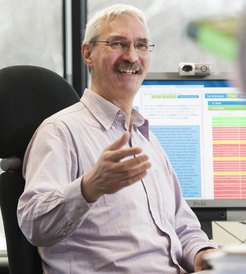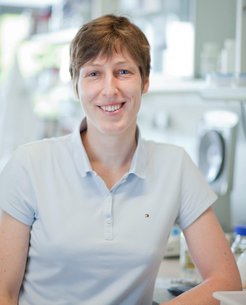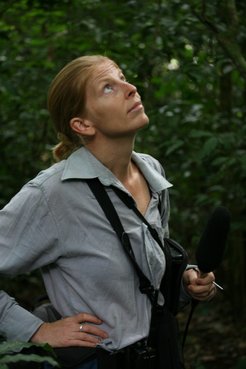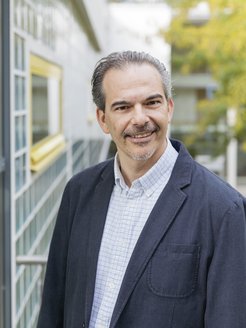Max-Planck grantees on their ERC research projects
ERC funding covers research projects at different stages of a researcher's career and enables, for example, projects involving several experts who join forces to research completely new areas. Below, researchers provide a glimpse into some of their projects - whether it is internet security, research into the desert climate, the social behaviour of chimpanzees, or new approaches to protein design.

Teamwork for a better Internet
Gerhard Weikum is well acquainted with the history of the Internet. However, the director at the Max Planck Institute for Informatics in Saarbrücken is far more interested in its future.
As a “digital backbone for communication, entertainment, education and business,” the Internet has become a “mainstay of modern society”. At the same time, there are “huge risks for users, for example due to data-tracking companies that collect, compile and sell personal data.” Given the global importance of the Internet, the solution cannot be to turn back time and the Internet. “We have to develop technical and legal conditions to place users on an equal footing with businesses, at least within the jurisdiction of the EU. Companies also benefit from this because it strengthens trust in the Internet in the long term.”
Many aspects of this are interlinked, which is why a number of different computer science disciplines are collaborating in the imPACT (Privacy, Accountability, Compliance and Trust in Tomorrow's Internet) project. The project is made possible by the ERC funding line of synergy grants. According to Weikum, the call for applications was “a real incentive to rise to the challenge.” ImPACT is a joint project involving the computer science professor Michael Backes of the University of Saarland and the directors at the Max Planck Institute for Software Systems, Peter Druschel and Rupak Majumdar. “Computer sciences cover many disciplines. The resulting network in itself is a real added value that brings together researchers from disparate communities. Twenty PhD students and postdocs have been to our imPACT retreats. This generates original ideas and new methodological approaches that no community would come up with on its own.”
Besides obtaining basic insights into the interactions of PACT characteristics, a further goal of the project, which will be completed in 2020, is to devise specific tools: “We also want to develop software that enables users to see and understand what data relating to them are available on the Internet and what risks such data potentially implicate.”
Keeping an eye of the evolution of protein molecules

“Protein Lego” is the title of the ERC project of the Bayreuth Professor of Biochemistry Birte Höcker. A catchy name for a complex and challenging endeavour, in which she is tracking the evolutionary history of protein molecules, the basic materials of all life. The former research group leader in the MPG has already shown that the diversity of proteins has resulted from the combination of smaller peptide units. She now plans to assemble new protein molecules from this set of building blocks. “The aim is to identify stable fragments from known structures and use them to build new complex, functional proteins during recombination,” Höcker explains.
This new approach to protein design could lead to the development of tailor-made proteins for medicine and biotechnology. In early 2015, when the biochemist was still working as a group leader at the Max Planck Institute for Developmental Biology in Tübingen, news came from Brussels that a consolidator grant had been approved. “Because the ERC has a reputation for basing its decisions solely on the excellence of the proposed scientific idea, the grant is regarded as a high distinction. I know lots of colleagues who list it in their CVs not as a grant but as a personal award,” Höcker says.
When she applied for her first professorship, she says, the ERC grant was a real trump card. She is now pursuing research for Protein Lego at the University of Bayreuth in parallel with her teaching duties. Over the life of the grant, which continues until 2020, she can fund a postdoc, three doctoral students and a technical assistant. “Before I became a professor, the ERC grant was also an important safeguard of my future scientific career,” she says.
Social life of chimps

When it comes to relating to other members of their species, there are parallels between chimpanzees and people: some relate well to others and maintain many friendships, while others can be unpopular and loners. In humans and other social mammals, social life has a direct impact on health, fertility and longevity: socially connected compared to isolated individuals tend to be healthier, more fertile and live longer. Due to the complex social life of humans, the causes of such variances in skills are difficult to identify. “Chimpanzees are easier to examine in this respect as they live in clearly defined groups. We can objectively measure their social interactions and networks, and non-invasively sample associated hormonal activity. Examining the social life of wild chimpanzees is likely to help us understand the variation we see in human social skills” explains Catherine Crockford from the Max Planck Institute for Evolutionary Anthropology.
The British behavioural researcher was awarded an ERC Starting Grant for her project “Ape Attachment” at the end of 2015. The funding enables her to study the social life of chimpanzees living in the wild in the Tai National Park in Côte d’Ivoire with her Research Group. She observes the animals and their social interactions, hormones and social cognition throughout their development, to establish what makes some chimpanzees particularly competent when it comes to social skills. “For example, we would like to know how much the ability to form enduring social ties is inherited, that is genetically predetermined. Also, what role does the childhood relationship with the mother play, and can later social experiences ameliorate early negative effects?” The ERC programme gives Crockford the security she needs to make long-term plans for her project in a research system usually based on two-year project periods. “And because an ERC grant is comparable to a prestigious award, it is also of benefit to me in my further career plans.”
In the case of the chimpanzees, another aspect comes into play: the ERC funding also contributes to protecting the apes against extinction in their natural habitat. “Wild chimpanzees can offer insights into human health, fertility and longevity. Hence, there is an inherent value in protecting them and their habitat. The fact that behavioural research on wild chimpanzees is being funded by the ERC is also indicative of the value of the research offered by long-term field sites, such as the Tai Chimpanzee Project” says Crockford.
Pioneering work in the desert

In the twenty-first century, major discoveries in familiar landscapes would appear to be a thing of the past. However, researchers who leave the beaten track can still make important finds – as for example Michael Petraglia from the Max Planck Institute for the Science of Human History in Jena, who is fulfilling one of the key criteria of ERC Advanced Grants by carrying out pioneering work beyond the boundaries of his actual research field. Together with his interdisciplinary team, Petraglia is investigating the early history of the Arabian Peninsula – the only researchers to do so. “It is really exciting. We feel like nineteenth-century explorers, we’re constantly discovering new things,” says Petraglia, who was awarded the grant at the University of Oxford and brought it to Jena in 2016.
For example, the scientists were able to prove that the desert was wet and fertile on multiple occasions over the past 500,000 years. The researchers discovered thousands of dried-up lakes and rivers on satellite images and started survey and excavating in different locations across Arabia. Their finds include fossils of elephants, jaguars and other savannah animals and many indicators of human life, like stone tools and rock art paintings. These provide pointers as to when a number of human species in the genus Homo genus spread out of Africa.
Petraglia considers the Advanced grant from the ERC one of the key milestones in his career, as it provided generous funding to conduct state-of-the-art research in an interdisciplinary work, while overcoming traditional boundaries between the sciences and the humanities. The ERC has also helped Petraglia to establish new scientific approaches and methods in field and laboratory work, that he will now carry forth at the Max-Planck.
mez/hr/je



